A warm tube game that came to us from the pre-computer era. Real greetings from the past, which, however, not everyone will be able to appreciate …

The deeds of bygone days, the traditions of the deep
Personal computers have become so firmly established that it is hard to believe that only a couple of decades ago they were very rare in homes. The place of computer games was then occupied by board games, which were mainly played in the company of friends. Actually, it was they who laid the foundation for many popular genres of computer games. Even the mechanics were sometimes copied almost one-to-one, and the computer itself simply played the role of the master.
One type of 'pre-computer' games is game books. In fact, it is analogous to modern RPGs for one player. Unlike many other games, they could be played alone without any problems; the host's help or the presence of other players was not required. It was the adventure of a single hero, controlled by the player … or would it be more correct to say 'reader'?
As far as I know, game books have been very popular in the West since the 70s. But in the countries of the Union they were much less known. If I'm not mistaken, Dmitry Braslavsky became the first (and as if not the only) at least somewhat popular author here. Moreover, his first book was published only in 1991 – several decades after the heyday of this genre in the 'world of capitalism'.
It was called 'Dungeons of the Black Castle' and looked like this:
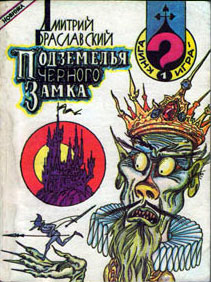
Over the course of several years, the books 'The Secret of Captain Shelton', 'The King's Faithful Sword' and 'Lord of the Endless Desert' were added to it. Several more books were announced a little later, but never went to print. The boom of personal computers put an end to this genre, the choice between a book-game and a game on a computer was quite obvious for most.

As a child, my friends and I got the first two books, and very quickly we wiped them almost to the holes. There was everything, and battles with insidious monsters, and travel to fairy lands, and the search for artifacts, and character leveling, and a bunch of other things. At the same time, the rules were very simple, two dice, a pencil and a piece of paper were enough for the game.
Each book was divided into many tiny paragraphs, each with links to the following. If you want to go on the road to the right – go to paragraph 7. If you want to go to the left – read paragraph 90. And to use a magic potion, add 5 to the number of the current paragraph and find out what happens in this case. A whole world opened before the reader, in which everything depended only on him. In most cases, there was no way back, to find out what would have happened if the player had gone on a different road, it was possible only on the next passage.
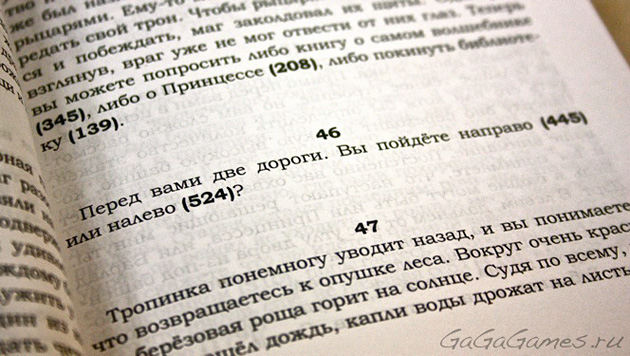
As in any self-respecting RPG, each character had its own characteristics – strength, agility, luck and charm. They were taken into account both in battles and during travel. Not every character could break down a closed door or climb across the river along a rope, for this it was necessary to have the appropriate value of strength and dexterity. The battles themselves were carried out using cubes – not only the characteristics of the character and his equipment played a role here, but also banal luck.
I will not venture to evaluate the complexity of those games based on childhood memories, but then they were enough for us for a very long time. The author's worlds turned out to be very solid in size, so the players had a lot of options, and the replay could be completely different from the past. And even after a dozen unsuccessful attempts, it was not nearly obvious how to get to the cherished goal. And even more so to defeat the main villain and stay alive.
Sorcery!
All this was many years ago. Now only a few remember the existence of such game books, they were replaced by modern games with three-dimensional graphics, artificial intelligence, complex special effects and a bunch of fashionable bells and whistles. Probably, someone will say that remembering all the antediluvian games of the past is now simply ridiculous. But there was something in them that now 90% of modern fashionable toys cannot give, where, despite the huge opportunities that modern computers open up for game creators, it is less and less common to find not only nonlinear passage, but even some interesting story.
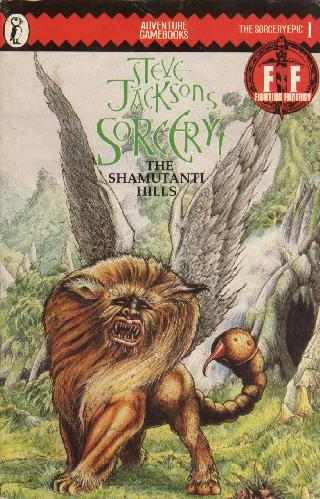
The Sorcery series! I came across almost by accident. And, to be honest, I just couldn't believe my eyes. After all, this is nothing more than a computer adaptation of one of the once famous books-games in the West. Moreover, the adaptation was done very carefully, as I understand it, the developers not only diligently transferred the entire text, but also preserved the author's illustrations. Although it doesn't really matter for you and me, I doubt very much that anyone saw the original.
[iframe url = '// www.youtube.com/embed/O6KrDNeaRzA' width = '640 ″ height =' 360 ″ scrolling = 'no' frameborder = '0 ″ marginheight =' 0 ']
I must say right away that the text is exclusively in English, there is no translation into Russian and, apparently, is not expected. He does not require deep knowledge of English, but you still need to have some kind of vocabulary, otherwise the pleasure of the game will be completely ruined.
Plot
The action takes place in the Fighting Fantasy universe (kind of famous, although I personally hear about it for the first time), the plot is pretty simple. Once upon a time there was a king, and he had a magical Crown of Kings, which endows its owner with amazing leadership qualities. Considering the impending war with all sorts of bad creatures from the neighboring region, the crown was very appropriate – it allowed to rally an army from different races and defeat the enemy. The problem is that just before that she was kidnapped by the enemy Archmage, who with her help is going to strengthen his army with new monsters. The player here acts as an unnamed hero who vowed to penetrate the very heart of enemy territory, fight the Archmage and return a valuable artifact.



However, first you need to at least get to the enemy country, which lies on the other side of the Shamutanti Hills. The path is not only distant, but also quite dangerous – the area is teeming with monsters and traps, and the locals are suspicious and unfriendly. The first part of the game is devoted to this journey, all of them should be four. Three games are already on sale on Google Play, and a fourth is on the way.
Game process
Outwardly, the game looks like this. A large card is revealed in front of the player, on which there is a figurine of his character. The closest places to visit are marked with blue flags. To get to the selected place, you just need to move the figure.
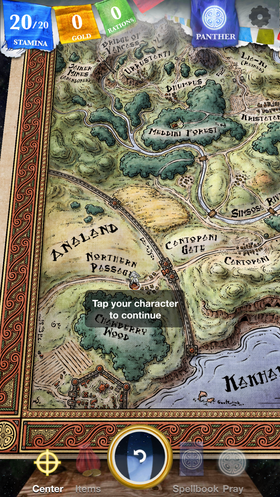

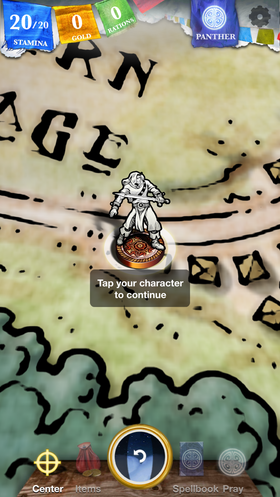


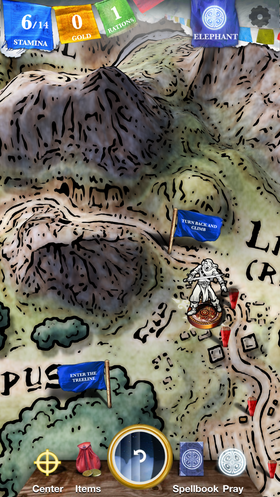
As before, the game is based on text. They describe to you in detail what is happening around, and offer a choice of several options for action. The player himself decides what to do in a given situation, and is responsible for his decisions. Something will backfire immediately, something closer to the end of the game, some will not affect this passage at all.
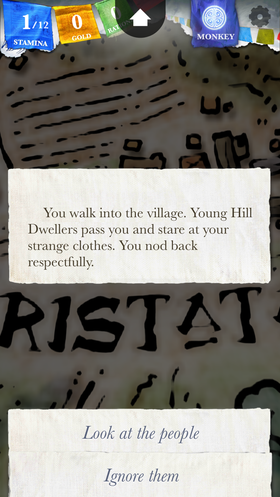

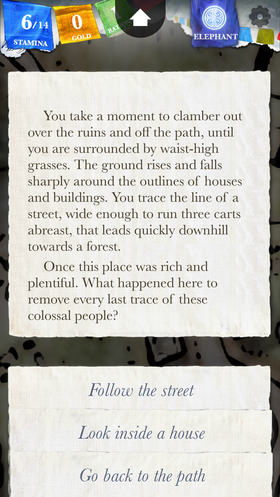
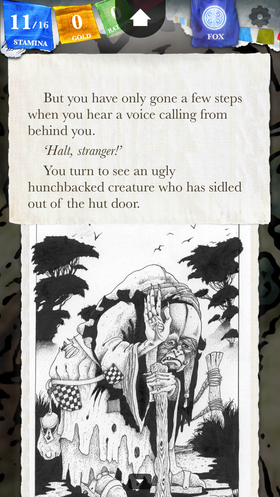


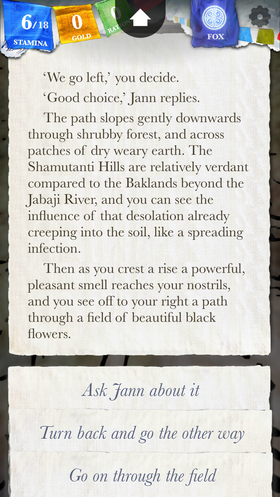

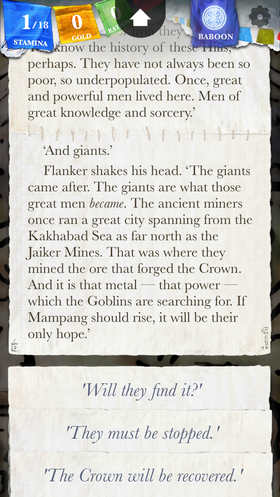
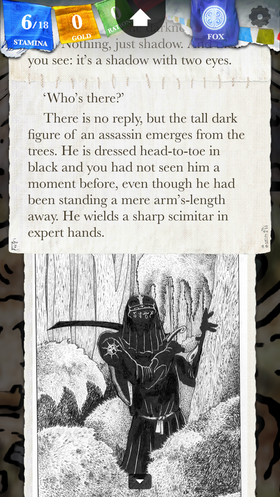


The combat mechanics have changed a bit. There are no dice now, instead of them there is now a scale of impact strength. The player himself chooses whether he wants to attack the opponent in this round or stand in a defensive stance, and also chooses the force of the blow. If both the player's character and his opponent decide to attack, then the attack with the greatest strength will be considered successful. The number of hit points that the wounded character will lose also depends on it. If one of the participants in the battle decides not to attack, but to defend himself, he will get off with only a slight wound, no matter how strong the attack of his enemy is.
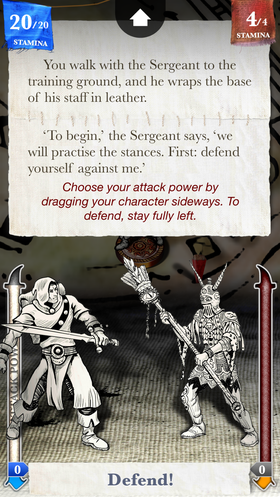

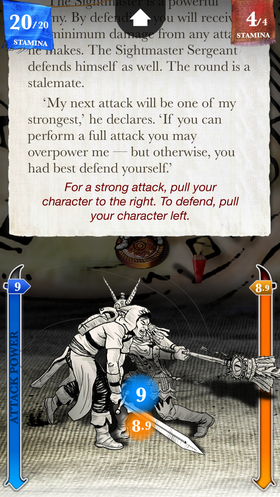
The main trick is that during the battle, both fighters get tired, each subsequent attack will be weaker than the last one. Willy-nilly, you will either have to alternate powerful strikes with weak ones, or rest using a protective stance. The player's task is not just to swing the sword for nothing, but to catch the enemy on a careless attack. Sometimes a textual description of the battle can help in this, sometimes – knowing the enemy or just luck.
The main feature of the 'Sorcery!' – a huge number of magic spells. Moreover, combat spells like a fireball or lightning are just the tip of the iceberg, there are enough other options in the magic book, from spells for finding the right path and various illusions to summoning monsters, protective spheres, magic fog, slowing down the fall, and everything else. There are about three dozen of them, although some may require special ingredients. They are allowed to be used often, but most of the spells will have to pay with vitality. So a beginner magician, throwing fireballs left and right, risks stretching his legs very quickly. In addition, magic can come out sideways – an untimely cast of weakness can hit the hero himself, and the magic fog caused by a strong wind will immediately melt without a trace. So you have to think here, especially since the player does not just choose a spell from the proposed list, but writes it from the available letters.
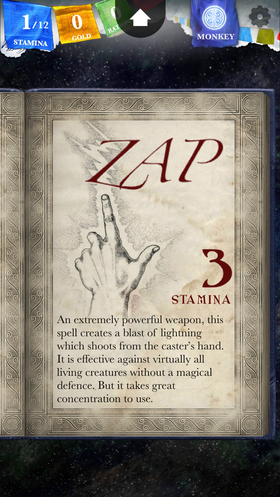

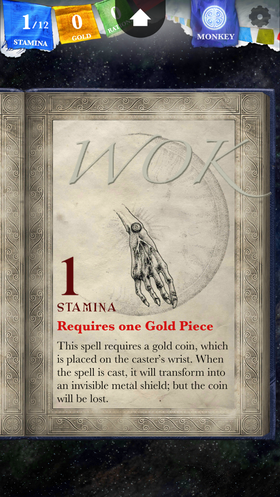
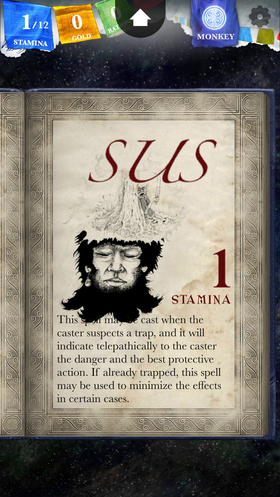

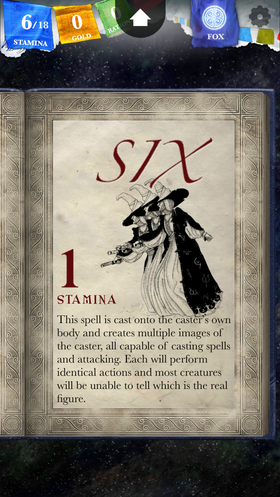
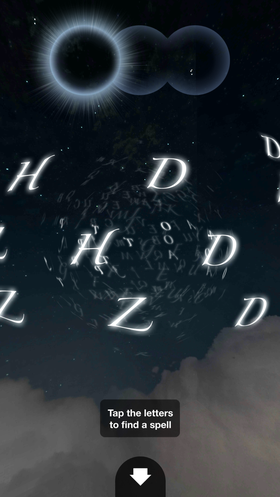

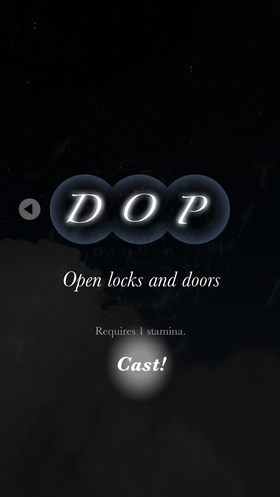
As a last resort, you can offer a prayer to the gods – they usually listen to the heroes, but only when they are not bothered too often. Each specific day can be 'shouted' only to a specific god, and each of them has its own specialization. Someone heals from wounds and diseases, someone helps to avoid the trap, and so on.
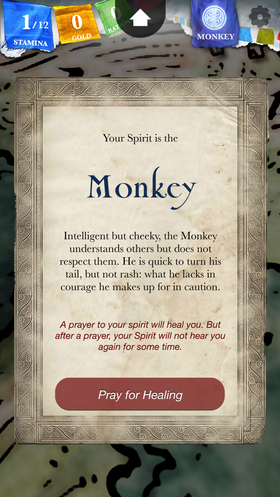

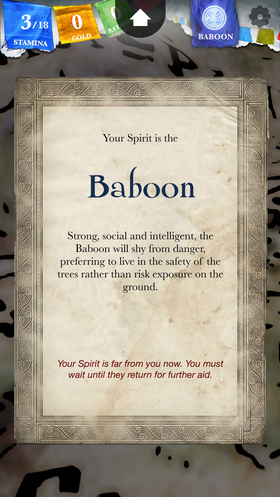
Although the main thing in this adventure is the head on the shoulders. Even the toughest hero shouldn't forget to buy supplies for the trip and arrange a night's sleep in time. Otherwise, he will crawl to the goal half-dead from hunger and fatigue and die from a simple kick.
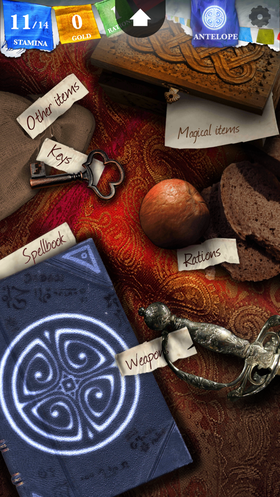


However, the game is very beginner-friendly and always allows you to replay the story from any moment. True, I'm not sure that this is so great – the temptation to rewind time is very great, but such 'cheating' quickly and imperceptibly kills all the fun of the game. It's like starting to read a detective story from the last chapter, the beauty of the author's intention after that will be very difficult to assess.
Impressions
The quality of adaptation does not raise any questions. Text, music, visual style, here on a solid top five. One feels what they did with the soul. On the one hand, the developers carefully preserved all the features of the 'warm lamp' book-game, on the other, they improved the old concept by adding movement around the map, drawing the contents of the inventory, tweaking the combat system, and so on.
The main fly in the ointment is the length of the game. In fact, we have just the beginning of the adventure, a kind of prologue. This is entertainment literally for one evening, despite the fact that the cost of the game by the standards of mobile applications is rather big – 200 rubles. I passed the game almost on the second try, although I beat one fight twice. The next part of the adventure is sold as a standalone game and costs the same. Yes, I understand that in the original, each part of the adventure was sold as a separate book, but for a computer game this is wildness. It's like selling a chessboard piece by piece. Or a song one verse at a time.
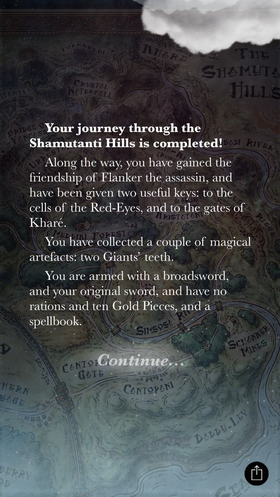

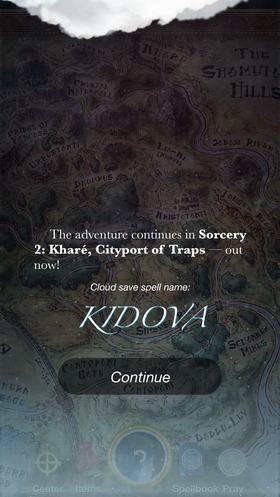
Even if we forget about the price, I am confused by one more thing. After successful completion, the game offers to save your progress in the cloud in order to continue playing with the same character in the next part. But, as far as I understand, this is not at all necessary, each part can be started from scratch. This means that decisions from the first part of the game will not have any special effect on the following chapters. Probably, some objects will facilitate the subsequent passage, and some acquaintances will then come around once on the way, but nothing more. One big open world game is not the same as four tiny locations. Even if the amount of text there is the same. The second option is by definition much more boring.
They say that the first game turned out to be the simplest, and the closer to the series finale, the richer the author's imagination and the more interesting it is to play. It seems that in the end the hero will be able to travel even in time, visiting the same places in the past, present and future. I can't say anything here, except for the first part I haven't played anything yet.
conclusions
A niche, but certainly well-made game with a pretty solid cost. If not for the duration, I could safely recommend to all fans of the genre, but this is more likely for those who miss the 'warm tube games'. However, modern players are unlikely to understand this format anyway – which is a pity, in my opinion, for mobile devices it is downright ideal.



